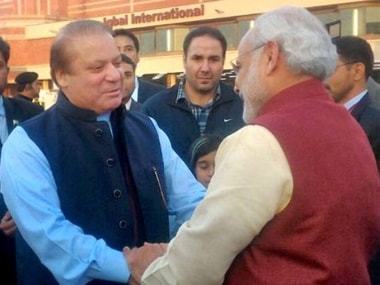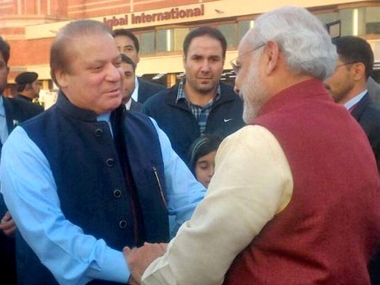India-Pakistan engagement, which has been moving full speed ahead since November, is very welcome. But it is probably too much, too late. It is too much, since the Pakistani establishment will see it as a climb-down. They are likely to attribute it to a panicky loss of nerve. It is too late simply because, if the government was going to show this sort of resolve, focus and purposefulness, it should have done it soon after Prime Minister Narendra Modi came to power in May 2014. That was a great opportunity. Nawaz Sharif’s body language when he visited New Delhi to attend Mr Modi’s investiture reflected Pakistan’s deep unease at that stage. There was a new strong-man in charge in New Delhi. Excellent results could surely have been achieved if Modi had behaved as ‘Vajpayee 2,’ as some had then hopefully called him. [caption id=“attachment_2559928” align=“alignleft” width=“380”]  PM Narendra Modi greeted by Pakistani counterpart Nawaz Sharif on his arrival in Lahore. PTI[/caption] Much has changed since then. So, however much they may publicly welcome India’s new initiatives for talks, Pakistani analysts are likely to gloat in their internal confabulations. They will attribute New Delhi’s changed stance to at least three factors. One, they will focus on the publicly enhanced relationship between Pakistan and China. That relationship is not new, but it has strengthened visibly over the past year or so in economic, political and strategic spheres. Two, Pakistani analysts will focus on their country’s much improved economic situation today, compared with a year ago. The country’s terms of trade with various international players has improved markedly. Three, Pakistani thinkers, particularly military ones, will surely get the impression that the recent international attention on their rapidly expanding nuclear arsenal has played a key role to bring India to the negotiating table. Pakistan seems set to obtain the third biggest nuclear arsenal after the US and Russia. In this context, `tactical nuclear weapons’ are of greatest concern. Pakistan’s strategists think they can actually use these in battlefields if India were to attack with conventional weaponry. There is another front on which things have changed radically in the last year-and-a-half: militant activity in Jammu and Kashmir and even Punjab. There have been some dramatic and upsetting attacks. Since Indian analysts explicitly see these as part of a proxy war, Pakistani analysts will be even more convinced that India has been spooked by these ground actions into changing its stance towards Pakistan. If indeed this is how the Pakistani establishment views the dramatic high-level meets, the atmospherics, and the narratives of bonhomie, the entire process might come to naught. The talks could be used to buy time while other moves get ready. It would not be the first time. Mr Vajpayee suffered the Kargil war within weeks of his extraordinarily successful bus trip to Lahore in February 1999. Between 1982 and 1984 too, a comprehensive agreement between India and Pakistan had been negotiated but was nixed by General Zia-ul Haq at the last minute. No doubt the fact that Pakistan acquired its nuclear capability in 1984 had a bearing on that volte face. The great tragedy this time is that a rare opportunity was lost last year. The election of a prime minister with a no-nonsense, tough-guy image – and the first Lok Sabha majority in a quarter-century – had given India an enviable advantage to engage Pakistan from a position of strength. Pakistan seemed weak and vulnerable at the time. After the flip-flops of the last year, not to speak of the Bihar assembly elections, that advantage has dissipated. Once more, intelligence failures are at least partly to blame. One reason why the government took such an ill-advisedly tough line last year was that the operatives on the ground and the think-tanks in Delhi had no idea of the militancy that was already getting set. Preparations for more militancy will almost certainly remain in process, although the veil of secrecy will be more tightly pulled across them. The intelligence agencies, the army, Jammu and Kashmir’s then Chief Minister Omar Abdullah, and Delhi’s think-tanks, were all convinced that there was no chance of more militancy. Their reasoning was simple: they could see no sign of infiltration across the Line of Control in Kashmir and the army and police brass thought they had comprehensive ground control. They were oblivious to the new generation of Kashmiri militants, who snatched weapons from forces deployed on the ground, and did not seem to cross the Line of Control for training. One must hope that the new and very bold initiatives we have witnessed in the seven weeks since the prime minister’s visit to Srinagar will succeed in stemming the tide of fresh militancy. But there can be no doubt that rolling back the momentum of militancy will be a far more challenging task than it might have been a year-and-a-half ago.
India-Pakistan engagement, which has been moving full speed ahead since November, is very welcome. But it is probably too much, too late.
David Devadas is an expert on politics and geopolitics. Formerly a Senior Fellow at the Nehru Memorial Museum and Library, Visiting Professor at Jamia Millia Islamia, and Political Editor of Business Standard, he is currently Distinguished Fellow at the Institute for Social Sciences. He has written books on Kashmir, on youth, and on history. He has been a radio compere, guest faculty at JNU's Academic Staff College, St Stephen's College and Hindu College. He has worked for the Indian Express, The Hindustan Times, India Today, The Economic Times and Gulf News. His most impactful article, on a murder cover-up, prevented a Congress President from becoming prime minister. One led to the closure of an airline, and another created a furore and consequent clean-up in Delhi's health department. Several have correctly predicted election results in key states, and a series of reports from Srinagar made the government aware of how unsettled the situation there was in 1990. He is an alumnus of St Xavier's School, St Stephen's College, and the Indian Institute of Mass Communication. He has lived for extended periods in Geneva and Berlin, and has traveled to almost 50 countries. He enjoys various kinds of music, theatre, design, architecture and art. see more


)

)
)
)
)
)
)
)
)



